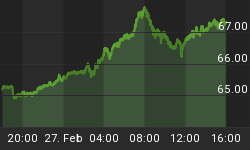Credit or blame who you will. The Senate Banking Committee, which seems more interested in holding a hearing with Paul Volcker over President Obama's banking proposals than the full body does in holding a vote to confirm the current chairman of the Federal Reserve. Elliott Wave Theorist Bob Prechter, who caused bulls' skin to crawl and stomachs to flip in a late afternoon CNBC interview, where he insisted that the next wave down for stocks is now underway. Small investors, who refuse to help hedge funds and others keep stocks propped up, and remain AWOL from this waning cyclical rally.
No matter your choice(s) of villain, the fact that the stock market has not meaningfully rallied from last week's beating is ominous. Today specifically, the Dow's nearly 100-point gain from early in the day was suspect from the start, accompanied as it was with little volume. The few bulls steadfastly keeping their fingers in the dyke did their best to rally stocks a few times after the early day push higher wavered. But by the time Prechter was interviewed by CNBC's Sue Herrera, the Dow's gain was whittled down to less than 30 points, and most other indices had already turned lower.
Adding to the technical damage of the lousy volume and breadth was that the markets' late day flagging gave us outside days with virtually all of the major indices. This means that today's highs were higher than yesterday's highest level, and today's lowest levels were lower than yesterday's lowest point. (I'll have a little "lesson" on this technical sign in the upcoming issue.) More often than not, the near-term bias is in favor of the close; which today was down, albeit slightly. Now, we found out the hard way a couple times last fall that an outside day down doesn't always translate into the continuation of a downtrend, if there are enough other forces to keep things rising. But the markets' overall mood has changed, as I said the other day.
One thing not mentioned prominently as the market frittered away the rest of its rally is the most common-sense reason for it having done so: few want to be "long" when the next few days could still bring political shocks to Wall Street. Even if I was a bull right now, I'd at least want to have one foot by the exit door in advance of tomorrow's House hearing where God-knows-what other shoe(s) may drop over the whole A.I.G. thing. Who knows whether one Ben Bernanke's name might come up? Undecided senators don't know; that's one reason they are publicly undecided. Apart from those 30 or so members of the Senate who have publicly said they'll vote for Helicopter Ben (and have thus revealed themselves as the central banking system's most reliable whores) most of the rest at least have enough sense to wait until after the House hearing. (BTW - Here's today's quiz: Who was the Federal Reserve chairman -- that means, the boss of the whole shootin' match -- during the time that one Timothy Geithner ran one of the Fed's banks that enabled all the shenanigans and cronyism over A.I.G.?)
As I said Monday, I think the fact that there's not even a firm vote scheduled for Bernanke under all the present circumstances is extraordinary. Senate Leader Harry Reid (D-NV) was quoted today as saying that a vote, "could happen Thursday or Friday." (my emphasis.)
Could happen!?
Now, my "gut" may yet be proven wrong, and Bernanke will get the 60-70 votes many are insisting he ultimately will, and win confirmation. If so, everyone involved may have got more than they bargained for, as Rep. Ron Paul (R-TX) suggested yesterday. Bernanke staying in his job will keep the Fed--and all it does--under a microscope.
Indeed, Dr. Paul suggested, that could be a good thing in the end.
Moving on, there was one other key development in the financial markets today that basically went unnoticed; yet, it suggested even more than U.S. stocks' technical failures that the whole "risk" party that has supported stocks and commodities (primarily) for months really is over.
That event: the surge higher in the Japanese yen.
On the surface, the fact that the yen even outdid the dollar's rise today is almost surreal. After all--in case you missed the news--Standard and Poor's cut Japan's outlook today to "negative", and threatened to follow through with a cut to the country's credit rating, due to that nation's lousy finances.
Now, this does nothing today to Japan's cost of credit. But that the yen can have such a sharp rally nevertheless shows the growing, across-the-board aversion to risk. Keep in mind that the yen has been used for years as a carry trade currency, well before the greenback was similarly used for that purpose. Thus, I think that today was an unwinding of risk--disproportionately, in Asia, which is also telling--by those who think that whatever bad may be associated with holding yen is better than risking the losses that may come elsewhere.
So, the case for the cyclical rallies for both stocks and commodities being over continues to build. All the financial and fundamental factors point in that direction. The only thing that prevents me from advocating additional bearish-oriented positions now is the uncertainty over just what will happen with the whole Bernanke/Fed business; a rally attempt could come once the uncertainty is over one way or another.















